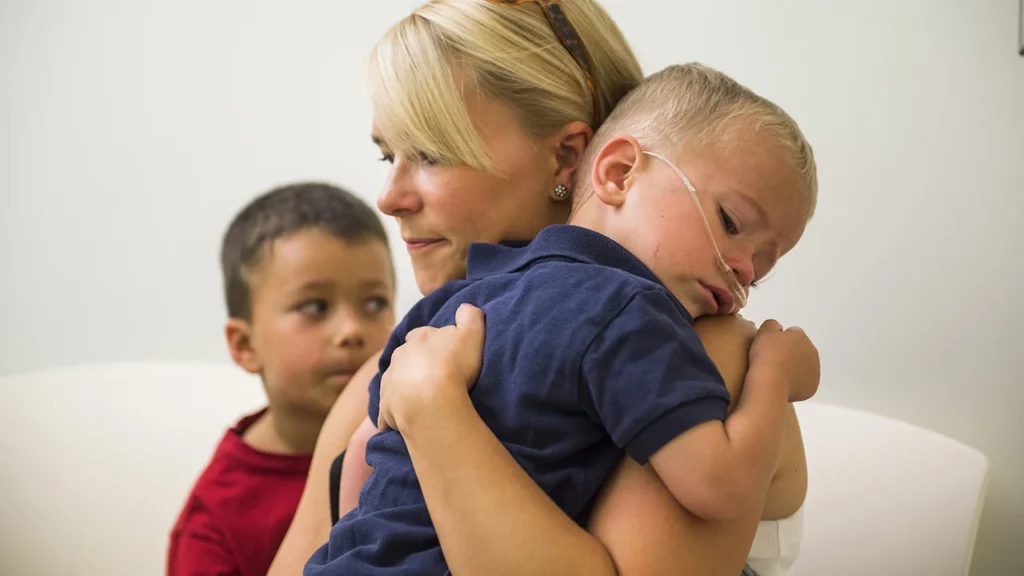Babies, with their developing immune systems, are naturally susceptible to a variety of illnesses. While this can be stressful for parents, understanding common ailments and how to handle them can alleviate much of the anxiety. This guide covers typical baby illnesses, their symptoms, and steps to take for care and prevention.

The Common Cold
Symptoms:
- Runny or stuffy nose
- Sneezing
- Mild fever
- Irritability
- Cough
What to Do:
- Hydration: Ensure your baby stays hydrated with breast milk or formula.
- Saline Drops: Use saline nasal drops to clear nasal passages.
- Suction Bulb: Gently remove mucus with a suction bulb for easier breathing.
- Humidifier: Use a cool-mist humidifier in their room to keep the air moist.
- Comfort Measures: Provide cuddles and keep them warm. Avoid using over-the-counter cold medicines unless prescribed.
Ear Infections
Symptoms:
- Pulling or tugging at ears
- Difficulty sleeping
- Crying during feeding
- Fluid drainage from the ear
- Fever
What to Do:
- Consult a Doctor: Ear infections often require antibiotics.
- Warm Compress: Apply a warm compress to the affected ear for pain relief.
- Pain Management: Use doctor-approved infant pain relievers like acetaminophen.
Fever
Symptoms:
- Body temperature above 100.4°F (38°C)
- Flushed skin
- Fussiness
- Decreased appetite
What to Do:
- Monitor the Temperature: Use a reliable digital thermometer.
- Dress Lightly: Keep your baby in light clothing to avoid overheating.
- Fluids: Offer more frequent breastfeeding or formula to prevent dehydration.
- Medication: Administer infant acetaminophen or ibuprofen (if approved by a pediatrician).
Note: Seek immediate medical attention if your baby is younger than three months and has a fever, or if the fever persists beyond 48 hours.
Diarrhea and Vomiting
Symptoms:
- Loose, watery stools
- Frequent vomiting
- Signs of dehydration (dry mouth, fewer wet diapers, lethargy)
What to Do:
- Hydration: Prevent dehydration with oral rehydration solutions (ORS).
- Breastfeeding: Continue breastfeeding; breast milk helps maintain hydration.
- Diet: For older babies, offer bland foods like bananas, rice, applesauce, and toast (the BRAT diet) once vomiting subsides.
Note: Contact a doctor if symptoms last more than 24 hours or if there are signs of dehydration.
Diaper Rash
Symptoms:
- Red, irritated skin in the diaper area
- Raised bumps or blisters
What to Do:
- Frequent Diaper Changes: Change diapers often to keep the area dry.
- Gentle Cleaning: Clean the area with warm water and pat dry. Avoid harsh wipes.
- Barrier Creams: Apply a thick layer of diaper cream containing zinc oxide.
- Air Time: Let your baby go diaper-free for short periods to allow the skin to breathe.
Teething Troubles
Symptoms:
- Swollen gums
- Excessive drooling
- Chewing on objects
- Mild fever
What to Do:
- Teething Rings: Provide a cold teething ring for gum relief.
- Massage Gums: Gently rub the gums with a clean finger.
- Pain Relief: Use baby-safe pain relievers if recommended by your doctor.
Croup
Symptoms:
- Barking cough
- Hoarseness
- Difficulty breathing (especially at night)
- Fever
What to Do:
- Steam Therapy: Sit with your baby in a steamy bathroom to ease breathing.
- Cool Air: Take your baby outside in cool air, which may soothe symptoms.
- Stay Calm: Keep the baby calm to prevent worsened breathing.
- Seek Medical Care: Consult a pediatrician if breathing difficulties persist.
Roseola
Symptoms:
- Sudden high fever lasting 3–5 days
- Rash that appears after the fever subsides
- Mild irritability
What to Do:
- Hydration and Rest: Keep the baby hydrated and ensure ample rest.
- Temperature Control: Use approved fever reducers.
- Monitor: Usually resolves on its own; consult a doctor if symptoms worsen.
Prevention Tips for Common Baby Illnesses
- Hygiene: Wash your hands frequently and encourage others to do the same.
- Vaccinations: Stay up-to-date with the recommended immunization schedule.
- Breastfeeding: Breast milk contains antibodies that boost immunity.
- Avoid Sick Individuals: Limit exposure to sick people, especially during cold and flu seasons.
When to Call the Doctor
Always consult a pediatrician if your baby:
- Is younger than three months with any signs of illness.
- Shows signs of dehydration.
- Has difficulty breathing.
- Develops a rash that spreads or worsens.
- Experiences persistent high fever.
Parenting a baby comes with its share of challenges, but being informed and prepared can help you confidently navigate common illnesses. By recognizing symptoms early and taking appropriate actions, you’ll be giving your baby the best care possible.
